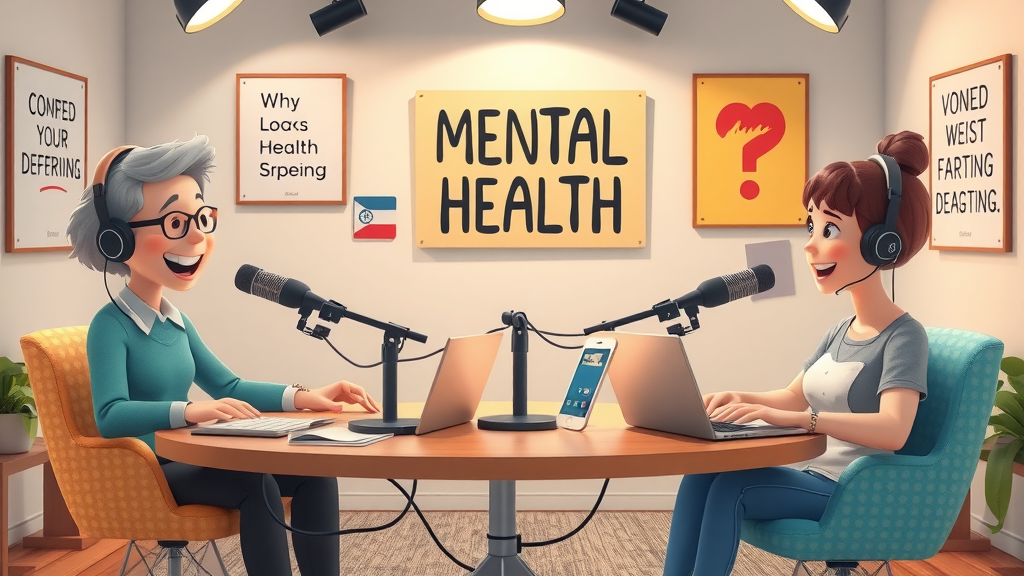Did you know that over 72% of potential clients search online for mental health services before ever making contact? If your practice isn’t at the top of local search results or showing up in the right places, you’re handing patients directly to your competitors. In today’s digital-first world, content marketing isn’t just a buzzword—it’s the foundation for behavioral health practices and therapists who want to grow, connect, and make a lasting community impact. Let’s explore the actionable content marketing strategies that transform awareness into appointments—and browsers into loyal clients for your health practice.
Why Content Marketing for Mental Health Professionals Is Essential Today

Startling statistics reveal that over 72% of potential clients begin their search for a mental health service online . More than ever, these clients rely on digital marketing and online content to find reputable behavioral health providers and choose the right therapist. If your health practice is invisible online or your marketing strategy is outdated, you’re likely missing out on a huge portion of your local audience. Content marketing allows health professionals—not just clinics, but solo therapists and counselors too—to showcase their expertise, answer urgent health topics, and be present when someone takes a critical step toward help.
- Startling statistics: Over 72% of potential clients search online for mental health services—are they finding your health practice or your competitors'?
- Growing digital engagement: Why a digital marketing approach is no longer optional for any health professional.
- Immediate steps to position your mental health practice as a leader in your community.
As more patients look for accessible behavioral health and telehealth providers, embracing a robust digital marketing strategy will help you stand out. Modern health care clients value quick access to reliable information, so your content marketing efforts should focus on building trust through user-friendly websites, impactful social media, and up-to-date blog posts. By adapting to these trends, you not only attract potential clients but also establish your health practice as a go-to resource in your area.
What You'll Gain from Proven Content Marketing for Mental Health Professionals

- How to attract and retain more potential clients for your health practice
- Best practices for building trust and authority as a mental health professional
- Which digital marketing strategies offer the highest ROI in behavioral health
Proven content marketing for mental health professionals does more than drive website visitors—it builds long-term relationships. A well-executed digital marketing strategy helps you attract more potential clients to your health practice and keep them engaged over time. Sharing consistent, educational content increases the likelihood of converting first-time visitors into loyal patients who refer others to your services. Sharing real-life success stories and responding quickly to inquiries shows the human side of your practice—and strengthens trust within your community.
Furthermore, high-quality content positions you as an authority in the field, establishing your reputation for excellence in mental health care. Digital marketing strategies like email nurture sequences, downloadable guides, and interactive webinars work together to demonstrate your expertise and compassion. The best practices you’ll learn here are designed to target your ideal audience, maximize your marketing ROI, and create a sustainable foundation for growth in a crowded mental health market.
Understanding the Unique Needs of Content Marketing for Mental Health Services
- Legal and ethical guidelines for health professionals using content marketing
- Protecting the dignity and confidentiality of mental health services

- Tailoring content marketing strategies to different health services: therapy, group sessions, telehealth, and more
Mental health professionals must recognize the unique boundaries and responsibilities that come with digital marketing. Maintaining client trust means protecting privacy and confidentiality. This is especially vital in content marketing, where case studies, blog posts, testimonials, or even casual social media shares must follow HIPAA and other relevant guidelines. Always obtain patient consent before telling stories, use de-identified case details, and avoid any information that could compromise dignity or confidentiality.
Next, your content marketing strategy should reflect the diversity of mental health services you offer—from individual therapy and family counseling to group sessions and telehealth. Each service attracts a unique target audience and requires tailored messaging. For example, educational blog content on anxiety strategies might support telehealth outreach, while testimonials from group therapy participants can foster connection. The key to marketing for mental health professionals is creating an authentic, ethical brand voice across every channel.
Types of Content That Convert for Mental Health Professionals
| Content Format | Best For | Benefits | Conversion Examples |
|---|---|---|---|
| Blog Posts | SEO, Education, Authority | Establishes expertise, drives organic search traffic | Appointments from informative articles |
| Patient Stories | Trust, Social Proof | Humanizes your health practice; builds empathy | Contact forms after reading testimonials |
| Videos & Podcasts | Engagement, Awareness | Improves accessibility, shares complex ideas visually | Increased social media sharing and followers |
| Downloadable Guides | Lead Generation | Provides value, collects email contacts for nurturing | Email sign-ups for resources |
| Email Marketing Sequences | Retention, Conversion | Nurtures new leads, shares targeted information | Follow-up bookings/consultation requests |
- Why client-focused educational content is central to effective mental health marketing
- Harnessing video and podcasting: Increasing behavioral health engagement through multimedia

- The role of social media in health professional outreach
The most effective types of content for behavioral health marketing are those that educate and empower your audience. Blog posts diving into mental health topics, FAQs, and common concerns help demystify therapy, reduce stigma, and provide immediate value to potential clients. Client-focused guides (such as “Managing Anxiety in the Workplace” or “What to Expect from Couples Therapy”) can both inform and act as lead magnets. Each piece of educational content solidifies your health practice’s authority and encourages further engagement.
Videos and podcasts, on the other hand, bring warmth and personality to your marketing strategy. By discussing complex topics in plain language and real-life terms, you put a human face on your health services, which improves both trust and reach. Social media amplifies this effect—providing genuine, consistent mental health tips, behind-the-scenes content, or even live Q&A sessions can spark meaningful community engagement and lead to more client inquiries.
Developing a Content Marketing Strategy for Mental Health Practices
- How to set clear, measurable goals for your digital marketing
- Mapping the client journey for potential patients and customizing content accordingly

- Scheduling content: Consistency matters for mental health professionals
Every effective content marketing strategy begins with clear, measurable goals. Decide what you want your audience to do—book a call, sign up for a newsletter, download a resource, or follow your practice on social media. Use analytics to set realistic KPIs (such as increasing website traffic by 20% or gaining 50 new email subscribers each month). Defining benchmarks at the start makes it easier to track ROI and adjust your tactics over time.
Next, map your potential clients’ journey from first discovery to booking their first appointment. Create diverse content that matches each stage—introductory blog posts and engaging social media content for awareness, detailed FAQs and guides for consideration, and patient testimonials or webinars for those ready to act. Consistency is key: publishing on a regular schedule keeps your practice top-of-mind and signals reliability to both search engines and potential patients. Use content calendars, scheduling tools, and automation platforms to stay organized and visible all year.
Keyword Research and Local SEO for Content Marketing for Mental Health Professionals
- Optimizing for search engine discovery: Local SEO tactics tailored for mental health professionals
- Choosing and using keywords like 'mental health service', 'behavioral health', and 'health practice' for maximum visibility
- Google My Business and the importance of reviews for health services

Keyword research is the backbone of content marketing for mental health professionals who want to be found online by local potential clients. Start by identifying core keywords for your specific health service (such as “anxiety counseling in [city]” or “behavioral health group therapy near me”). Incorporate these naturally into blog posts, service pages, and social media profiles. Local SEO involves optimizing your Google My Business listing, encouraging satisfied clients to leave reviews, and ensuring your practice’s name, address, and phone number are consistent across the web.
Optimize each piece of content for your target keywords—but always prioritize readability and compliance. Using structured headings, meta descriptions, and clear call-to-action statements will help your website rank higher in search results. Regularly updating your Google My Business profile with current hours, new services, and fresh photos means your health practice will show up when local patients need it most. Remember: most health care seekers won’t look past page one of a search engine, so strong local SEO and reputation management are critical to consistent growth.
Maximizing the Power of Social Media in Content Marketing for Mental Health Professionals
- Selecting platforms: Which channels attract the most potential clients for mental health services
- Storytelling and engagement: Social media content ideas that drive conversations about mental health

- Crisis management and reputation building for health professionals on social media
Social media is a powerful tool for behavioral health professionals who want to build relationships, reach new potential clients, and foster community conversation. Begin by selecting platforms where your audience is most active—Facebook and Instagram are widely used for personal connections, while LinkedIn helps network with other clinicians and community partners. Educational Instagram reels, inspirational patient quotes (with consent), or “day in the life” behind-the-scenes stories keep your channels engaging and approachable.
Use social media not just for promotion, but for authentic storytelling and mental health advocacy. Address trending health topics, share self-care tips, and invite followers to ask questions or join webinars. When challenges arise—such as misinformation, negative comments, or crisis events—respond promptly, professionally, and with empathy to build trust and reinforce your practice’s reputation as a safe, reliable health service provider.
- Showcase: Successful local SEO campaign for a small mental health practice
- Step-by-step walkthrough: Building a patient-centered content calendar
See digital marketing in action with case studies: For example, a small local health practice increased bookings 45% in six months by optimizing their local SEO, gathering authentic Google reviews, and posting weekly “mental health tips” videos on social media. Another success story involved building a patient-centered content calendar—mapping the year’s blog post topics to align with mental health awareness months, client questions, and seasonal stressors. This systematic approach led to a 2x increase in website traffic and a measurable rise in new client inquiries, proving that targeted content marketing drives tangible results for behavioral health providers.
Building Trust With Email Marketing in Mental Health Marketing Strategy
- Designing compassionate nurture sequences for potential clients

- Maintaining privacy and compliance when running email campaigns for health services
Email marketing is a proven way for health professionals to nurture potential clients and keep current patients engaged. Design “welcome” sequences for new subscribers that introduce your health practice’s philosophy, provide valuable self-care tips, and include clear instructions for booking an appointment. Segment your contact list so existing patients get different updates than new leads, and always maintain compliance with privacy regulations—never share patient information or send unsolicited health content.
Strong email marketing campaigns can provide regular check-ins, encourage feedback, and invite clients to events such as webinars or support groups. Always use secure, HIPAA-compliant email platforms and give recipients easy opt-out options. When done correctly, email marketing reinforces your practice as a trusted part of their mental health care journey and supports better outcomes for both your business and your patients.
Behavioral Health Content Marketing: Connecting With Potential Clients Authentically
- Understanding patient concerns and reducing stigma through thoughtful content
- Ethical storytelling: Sharing success stories and testimonials in behavioral health
- Resources and guides: Positioning your mental health practice as a trusted advisor

Authenticity is at the heart of successful behavioral health content marketing. Addressing patient concerns openly—such as anxiety about therapy or cost worries—and offering nonjudgmental, stigma-reducing resources can make all the difference for someone seeking help. Share patient success stories (with explicit consent and anonymization) to humanize your practice, demonstrating real outcomes while promoting hope and resilience.
Position yourself as a resource: publish downloadable guides, host live webinars on trending mental health topics, and offer support via regular newsletters. These content marketing strategies not only attract new potential clients, they also demonstrate your ongoing commitment to community well-being, establishing your health practice as a trusted advisor for the long term.
Measuring Success in Content Marketing for Mental Health Professionals
- Key digital marketing metrics: Website traffic, leads, client bookings, and retention
| Metric | What to Measure | Frequency | Why it Matters |
|---|---|---|---|
| Website Traffic | Unique visitors, page views, top content | Monthly | Shows growth in audience and content effectiveness |
| Leads Generated | Contact form completions, email sign-ups | Monthly | Indicates interest and potential for new patients |
| Client Bookings | Appointment requests, calls | Monthly | Directly tied to revenue and practice growth |
| Retention Rate | Repeat appointments, ongoing engagement | Quarterly | Shows client satisfaction and effectiveness |
- Using feedback from potential clients and patients to refine your content

The success of any content marketing for mental health professionals should be measured by more than just website clicks. Track key metrics like web traffic, inquiries and bookings, client retention, and positive reviews. Regularly solicit patient feedback—use surveys to ask what kind of mental health content they find most helpful and which digital channels they prefer. Use data to adjust your marketing strategy, build upon what’s working, and pivot away from what isn’t.
Monthly or quarterly reviews of your digital marketing dashboard can identify trends, peak periods for bookings, and content types that drive the most engagement. This results-focused approach ensures your behavioral health practice is always learning, improving, and growing—both for your clients and your business.
Quotes From Leading Health Professionals on Content Marketing
" Content marketing allows us to break down barriers and open up genuine conversations about mental health services with our communities. "
— Licensed Clinical Psychologist
" A strong content marketing strategy has been essential in connecting our team with people in need of behavioral health support. "
— Behavioral Health Practice Director
The Best Tools for Content Marketing for Mental Health Service Providers
- Must-have content planning and scheduling software for health professionals
- SEO plugins and local search tools targeted at health services

- Digital marketing analytics suites for mental health practices
- Affordable website builders optimized for behavioral health professionals
Equip your health practice with the right digital tools to streamline and elevate your content marketing. Start with content calendars and scheduling platforms (like Trello, Asana, or Hootsuite) to stay consistent across all channels. Pair these with SEO plugins (such as Yoast for WordPress or Moz Local for local SEO tracking), and you’ll improve both the reach and ranking of your website and blog posts.
Analytics platforms—Google Analytics, SEMrush, or even specialty behavioral health dashboards—help track every content marketing effort from click to client. Choose website builders or themes optimized for health services so your site loads quickly, looks professional, and simplifies appointment scheduling. Putting these digital marketing tools in place sets the stage for sustainable growth and measurable results.
Common Mistakes Health Professionals Make in Content Marketing and How to Avoid Them
- Neglecting compliance and privacy: Pitfalls in content for mental health professionals
- Inconsistent messaging: Why every health service needs a content style guide
- Overlooking local SEO for potential clients
- Failing to measure and adapt: The danger of stagnant digital marketing strategies
Even well-meaning digital marketing campaigns can stumble if they overlook industry-specific best practices. The most common issue in content marketing for mental health professionals is failing to comply with privacy regulations—never share identifying patient details or testimonials without explicit, documented consent. Inconsistent messaging can sow confusion and mistrust, so develop a clear style guide outlining your practice’s values, voice, and visual identity.
Don’t forget the crucial role of local SEO in attracting potential clients within your area. Many practices focus only on broad keywords, missing out on the high-converting searches that include location-based terms. Always review and update your strategy: set aside time every month for auditing website analytics, content performance, and social engagement. Agile marketing efforts that listen and adapt to client feedback are far more effective than static, “set it and forget it” approaches.
- Topic research for mental health services blog
- SEO optimization and content formatting tips
- Sharing and promoting the post across digital marketing channels
Take your content marketing to the next level with a step-by-step video tutorial: Start with researching trending mental health care topics using keyword tools and feedback from your audience. Craft a helpful, empathetic blog post that answers key questions—incorporate your primary keywords naturally, use headings for scannability, and add engaging images or infographics. Don’t forget a clear call to action at the end, urging readers to book an appointment or subscribe to your newsletter. After publishing, promote the post on your social media, email marketing campaigns, and local community groups for maximum reach and engagement.
People Also Ask: How to Market Mental Health Services?
- Comprehensive approaches to health marketing for mental health service providers
- Creating trustworthy content, leveraging local SEO, engaging on social media, and using targeted email marketing: practical steps for marketing mental health services
To effectively market a mental health service, start with trustworthy educational content—blogs, videos, and guides that address real patient concerns. Focus on local SEO so your practice appears in searches for providers in your community. Engage regularly on social media to foster connection and awareness, and launch targeted email marketing to keep your services top-of-mind. Combine these steps for a holistic approach that attracts and retains clients.
People Also Ask: What Are the 4 C's of Content Marketing?
- Explaining the 4 C's: Content, Context, Connection, and Community for health professionals
- How mental health marketing leverages each 'C' to connect with potential clients
The 4 C's of content marketing are Content, Context, Connection, and Community. For health professionals, this means sharing relevant content (educational, empathetic articles), providing context (personalized to the patient’s journey), fostering genuine connection (using stories and direct engagement), and building a supportive community (online groups, webinars, and Q&A sessions). Together, these drive trust and successful client relationships.
People Also Ask: How to Create Content for Mental Health?
- Best practices for mental health professionals creating sensitive and impactful content
- Leveraging different types of content (educational posts, webinars, infographics) to address potential patients' needs
When creating content about mental health, always approach topics with sensitivity and empathy. Use language that reduces stigma, provides actionable tips, and respects personal experiences. Incorporate a mix of content types, such as concise blog posts, video explainers, and interactive webinars, to reach different learning styles and address the unique needs of your potential patients.
People Also Ask: What Is the Best Marketing for Therapists?
- Combining content marketing, digital marketing strategies, and local SEO for optimal reach
- Utilizing results-driven tactics: Success stories from behavioral health professionals
The most effective marketing for therapists integrates content marketing (blogs, videos), digital platforms (social media, email marketing), and local SEO targeting. Consistency, authenticity, and a strong online presence make your practice the first choice for those seeking mental health support. Case studies from leading behavioral health professionals prove that this multi-channel approach boosts visibility and bookings.
- Demonstration: Creating engaging short-form posts for health professionals
- Guidelines for sharing mental health resources and community-building content safely
Learn to create and share short, engaging social media posts that encourage interaction and awareness—think Instagram reels on managing stress, Facebook groups for support, and Twitter threads with tips. Always prioritize privacy and use only information suitable for public sharing. Consistent, authentic outreach helps establish your mental health service as a community hub for wellness.
Top FAQs for Content Marketing for Mental Health Professionals
- How often should a mental health practice publish content to stay relevant? Aim to publish at least one new blog post or video per week, supplementing with regular social media and monthly email updates to maintain consistent engagement and search engine presence.
- What compliance considerations exist for health services content marketing? Always follow HIPAA and local privacy laws, use de-identified data, and obtain consent for testimonials or case studies to safeguard client privacy and trust.
- Which types of content generate the most patient inquiries? Educational articles, authentic success stories, and engaging videos tend to drive the highest client interest and inquiries, especially when combined with local SEO.
Essential Takeaways for Maximizing Content Marketing for Mental Health Professionals
- Every health professional must prioritize building trust, authority, and visibility in their community
- Combining ethical digital marketing, health marketing, and local SEO leads to sustainable growth for any mental health practice
Begin Growing Your Health Practice with Effective Content Marketing for Mental Health Professionals
- Don't wait to make your practice the first choice for potential clients and patients seeking behavioral health support
- Discover The Biggest & Best Traffic Source For Your Business. This Works For Amazon, Walmart, Ebay & 1000s of Local Businesses… And Will Work For You Too! https://theamplificator.clientcabin.com/app/info
Take your next step and begin implementing these content marketing strategies today. Your future clients—and your growing practice—will thank you.
 Add Row
Add Row  Add
Add 




Write A Comment